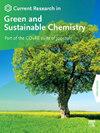裁剪沸石增强燃烧后二氧化碳捕获:一个关键的审查
Q2 Materials Science
Current Research in Green and Sustainable Chemistry
Pub Date : 2025-01-01
DOI:10.1016/j.crgsc.2025.100451
引用次数: 0
摘要
化石燃烧主要导致全球变暖,增加了大气中的二氧化碳含量,而二氧化碳是一种重要的温室气体,具有环境风险。大气中二氧化碳含量的增加强调了限制二氧化碳排放的必要性,同时使其脱离碳循环。人们创造了各种多孔吸附剂作为捕获二氧化碳的吸附剂,但这些吸附剂的效果一般,需要升级为更高效的多孔吸附剂,以解决二氧化碳造成的全球气候问题。沸石类吸附剂具有孔径可调、化学稳定性高、吸附选择性好和表面积大等特点,因此被认为是二氧化碳捕集的理想材料。它们的框架结构允许进行分子筛分、离子交换和表面改性,从而进一步提高了吸附效率和再生能力。本文章由计算机程序翻译,如有差异,请以英文原文为准。
Tailoring zeolites for enhanced post-combustion CO2 capture: A critical review
Fossil combustion mainly contributes to global warming and increases atmospheric CO2 levels, an essential greenhouse gas and environmental risk. The atmospheric CO2 level increased, emphasizing the necessity to restrict the emission while maintaining it out of the carbon cycle. Various porous adsorbents were created as CO2 capture sorbents, but they have been just moderately successful and require upgrading with more efficient porous adsorbents to address global climate issues caused by CO2. Due to their tunable pore sizes, high chemical stability, superior adsorption selectivity, and large surface area, zeolite-based adsorbents are considered promising materials for CO2 capture. Their framework structures allow for molecular sieving, ion exchange, and surface modifications, further enhancing their adsorption efficiency and regeneration capability.
求助全文
通过发布文献求助,成功后即可免费获取论文全文。
去求助
来源期刊

Current Research in Green and Sustainable Chemistry
Materials Science-Materials Chemistry
CiteScore
11.20
自引率
0.00%
发文量
116
审稿时长
78 days
 求助内容:
求助内容: 应助结果提醒方式:
应助结果提醒方式:


